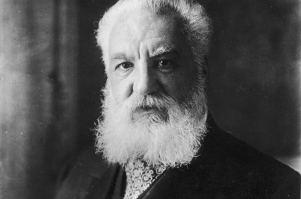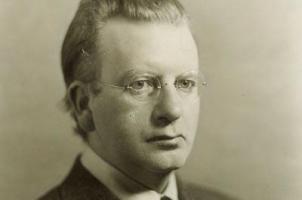>> Alexander Graham Bell
John Logie Baird <<


If you want proof of how Scottish ingenuity has transformed the world you need only look at the inventions which have shaped us all, and there can be few inventions that have had greater impact than the telephone and television. The day after the 91st anniversary of the first successfully-transmitted television picture seems a good day to celebrate John Logie Baird, the Helensburgh-born inventor who, in 1925 gave the world moving pictures beamed into homes for the first time. Prior to that, the world had been connected via telephone, courtesy of the pioneering work of Edinburgh native Alexander Graham Bell who patented the first device in 1876, though he did not live to see Baird’s invention. Given our modern obsessions with both the telephone and the television, and notwithstanding the well-documented problems they sometimes cause us, both Scots have changed society in ways they could never have envisaged.
Memoir Concerning the Transmission of Speech
by Gerrie Fellows
You did not consider yourself an inventor
though you tuned the telegraph’s electric codes
to clone voices from the shapes of waves
a machine for the transmission of speech
it made you one of the speculative elect.
You did not consider yourself an inventor
you taught the deaf to decipher meaning
to articulate words through visible speech
a child’s hands tied behind her back
not violence a necessity of assimilation.
You did not consider yourself an inventor
of cruelties or divisions or constructs
your speculative mind simply invented devices
to locate icebergs split salt from seawater
the photophone a posting of speech by sunlight
a conversation clouded by weather
as the transmission of sound was clouded
by your notions of hereditary deafness
of a nation diminished by defective genes.
You did not consider yourself an inventor
but a thinker concerned to prevent
a deaf variety of the human race
love and its transmission
by a visible speech you reckoned primitive
foreign as weakness or difference
the gestures the facial grimace of signs
its visual alphabet and spatial grammar
the hand and the face making a poem of the deaf
a commonality and communication
that were not yours
to which you were not listening.
Stooky Bill
by Ross Wilson
An old tea chest,
biscuit tin, hat box,
scissors, darning needles,
glue and sealing wax,
were among the ingredients
John Logie Baird chose to mix
into his ‘machine for seeing
by wireless.’
Some thought he was a lunatic.
One feared he might have a razor.
All he had was a ‘televisor’
and Stooky Bill,
a ventriloquist dummy
who’d turn out to be
the first face transmitted
via primitive television.
Imagine his first demonstration,
Stooky Bill under arm,
he tries to explain his machine
like a performer everyone laughs at
on a talent show broadcast
into millions of living rooms
a century after
the dummy’s performance.
Biographies
 Gerrie Fellows’ most recent collection is The Body in Space (Shearsman, 2014). Her work includes several sequences exploring the effects of technologies on places and people: hydro-electricity in The Powerlines and in-vitro fertilisation in Window for a Small Blue Child. A New Zealander by birth, Gerrie has lived in Scotland for thirty years. Her work can be found at www.gerriefellows.co.uk.
Gerrie Fellows’ most recent collection is The Body in Space (Shearsman, 2014). Her work includes several sequences exploring the effects of technologies on places and people: hydro-electricity in The Powerlines and in-vitro fertilisation in Window for a Small Blue Child. A New Zealander by birth, Gerrie has lived in Scotland for thirty years. Her work can be found at www.gerriefellows.co.uk.
 Ross Wilson comes from Kelty, West Fife. His first pamphlet collection, The Heavy Bag, was published by Calder Wood Press in 2011. His first full collection will be published by Smokestack Books in 2018. He lives and writes in Condorrat, North Lanarkshire, and works as an Auxiliary Nurse in Glasgow.
Ross Wilson comes from Kelty, West Fife. His first pamphlet collection, The Heavy Bag, was published by Calder Wood Press in 2011. His first full collection will be published by Smokestack Books in 2018. He lives and writes in Condorrat, North Lanarkshire, and works as an Auxiliary Nurse in Glasgow.
Images courtesy of;
http://headsup.boyslife.org/files/2013/04/main_AlexanderGrahamBell.jpg
http://www.heraldscotland.com/resources/images/3807866.jpg?display=1&htype=0&type=responsive-gallery
Ross Wilson photo by Eamonn McGoldrick
